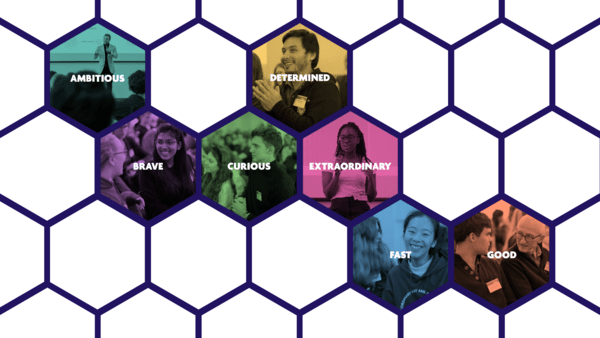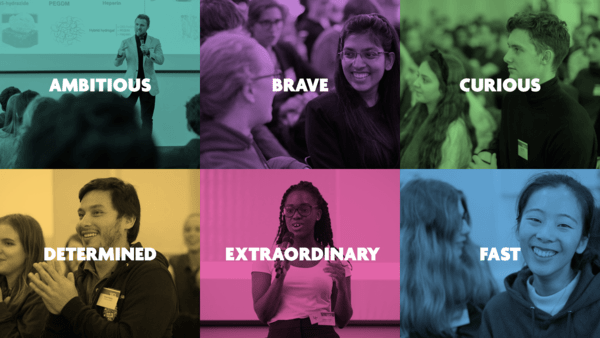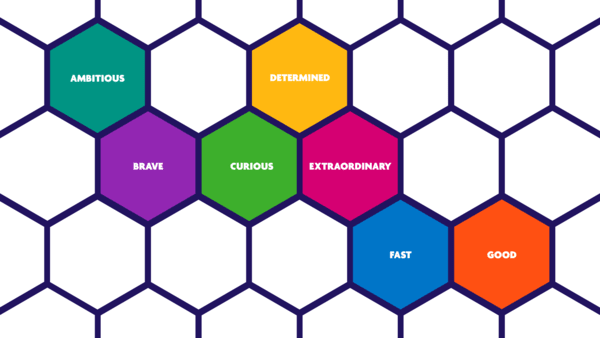
The Laidlaw Undergraduate Research and Leadership Scholars Program seeks to develop undergraduate research and leadership skills by supporting first-year students who wish to pursue innovative projects and community engagement that will help them develop the knowledge and skills to serve as future leaders in their respective fields. Please read about research options in the Program Overview section titled "First Summer".
Want to learn more? Read about becoming a Laidlaw scholar and the scholar experience from students of St. Andrew's University and/or watch "Become a Laidlaw Undergraduate Research & Leadership Scholar," from the Laidlaw Foundation.

Program Overview
The Scholarship Program funds up to 25 undergraduate students over two consecutive summers, before and after the sophomore year in the College. This program is funded by the Laidlaw Foundation, which has instituted similar programs at a number of leading universities in the United States and internationally, creating a robust network of scholars and alumni who are affiliated with the program.
The Scholarship provides 16 months of programming that begins in the spring semester of your first year in the College, and ends in the fall of your junior year in the College. These activities allow you to:
- Develop leadership skills through training and community engagement;
- Develop research and analytical skills and pursue a research project;
- Build your network by collaborating with leaders in your field, be they faculty members or community leaders;
- Learn from an academically talented community of students at Columbia and across the world who are future leaders in fields across the disciplines;
- Strengthen your resume and your competitiveness for future opportunities.
- Travel internationally and connect with communities and people around the world.

First Summer
The first summer consists of a combination of training on leadership, research fundamentals and disciplinary research on campus. The first week of the program will allow the entire cohort to explore topics such as searching for and discovering primary and secondary resources, as well as understanding “knowledge architecture,” from structures of information to the ethical implications of information use. The remaining five weeks will focus largely on each student's individual research project, with meetings to discuss questions, discoveries, challenges. This first summer allows students to develop a research project while staying on Columbia's campus and working under the supervision of a Columbia faculty member. The duration of the program corresponds to Summer Session A.
Please note that students are expected to devote themselves full-time for the duration of the program to their research project (i.e. 30+ hours/week), so participation in the Laidlaw Program is not compatible with attending summer classes, holding down another job, etc. The Laidlaw program coheres with Summer Session A. Students must commit to being in-person, and on campus for the entirety of Summer Session A to be eligible for this opportunity.
Independent Research Projects: You should apply to the Laidlaw program with an independent research project proposal. To propose an independent research project, you will need to develop a research project. While you are not required to identify a faculty mentor prior to submitting your application, having a confirmed faculty mentor will advantage your candidacy. (And even if you don't have a supervisor confirmed, the application does ask you to provide the names of a few faculty members who might be appropriate candidates for this role.
Second Summer
- The second summer as a Laidlaw Scholar (following your second year in the College), is meant to expand your leadership skills, to engage a community outside of the walls of the university, and to allow you to 'step out of your comfort zone'. There are two possible kinds of engagement you can consider for the second summer (please note that continuation of research in the lab, library or archive is not possible); students may identify and/or develop a community project with a non-profit or NGO that allows them to engage with a community that will benefit from their contributions, and that will allow them to utilize your leadership training; or a student may participate in a Laidlaw organized Leadership-in-Action project, which is an immersive program developed in collaboration with the Laidlaw Foundation. The goal of this second summer is to provide you with the opportunity to contribute to a community to which you are committed. (If this is a scholarly group, this might be an underexplored area of study; if this is a social group, this might be about an issue of, for example, injustice or underrepresentation; if this is an environmental group, it might address a specific area, such as climate change.)
- Projects or experiences with an international focus are particularly welcome, and international engagement is a required component of the second summer (with exceptions given to anyone who is unable to travel). Partnerships or collaborations with international universities who are fellow sponsors of the Laidlaw Research and Leadership Programme are also possible, including our partner programs in other countries (including Durham University, the University College London, University of Leeds, University of St. Andrews, the University of York; the University of Hong Kong; the University of Toronto, and others), which may provide further resources and networking opportunities.
- Please note that students are expected to devote themselves full-time for the duration of the program to their leadership project (i.e. 30+ hours/week), so participation in the Laidlaw Program is not compatible with attending summer courses, holding down another job, etc.
- Laidlaw organized Leadership-in-Action projects can be found on the Laidlaw Network (you must be a Laidlaw Scholar to have access to this page)!
- Second summer Laidlaw proposals are due the first Monday in March, each year.
Laidlaw organized leadership in action projects, summer 2024
- Leadership in Action projects vary each summer, but below is an outline of a range of projects available in Summer 2024 as organized by the Laidlaw Foundation. If you are a current Laidlaw Scholar, please refer to the Laidlaw Network for additional details. If you applying to the Laidlaw program, you are welcome to reference one of these projects in your application, understanding that the offerings do change year to year.
Project 1: Climate Change and Its Social Impact
- Based in Mexico, this leadership in action seeks to support social perspectives to understand and tackle climate change.
Project 2: Indigenous Communities
- With more than 71 indigenous ethnicities, Peru is a country that has learned the importance of building innovative approaches to engage, collaborate and include its native communities in all sectors. Scholars will collaborate with entrepreneurs and local organizations to develop a project plan and mobilize volunteers to implement it together.
Project 3: Peace and Social Resilience
- Based in Colombia, this leadership initiative provides an immersive experience in initiatives that promote citizen engagement, social inclusion, and cultural transformation.
Project 4: Village Health Team Training
- For Scholars, the goal of this Leadership in Action health team is multifaceted, with Scholars supporting our existing health programs by working with our Ugandan team to lead health education in our 16 partner primary schools, as well as supporting healthcare initiatives outside of the classroom.
Project 5: Conservation Education
- The goal of the Leadership in Action conservation team will be to support the existing conservation education activities in our 16 partner primary schools, and to connect students with Ugandan professionals working in conservation. In addition, the scholars will assist our elephant and bee conservation efforts by monitoring beehives that have been placed along the forest edge as deterrents to elephants traveling outside of the forest and into local farms.
Project 6: Cultural Storytelling
- The area of western Uganda where the Kasiisi Project operates is home to the Batooro people who have a rich cultural heritage including the use of Empaakos or ‘pet names’ which have been recognized by UNESCO on their list of Intangible Cultural Heritage Practices. We currently have a conservation storytelling project underway involving village elders and students. Scholars will support this work by helping to analyze collected stories for conservation and other themes of interest.
Project 7: CraftHER
- Based in India, "CraftHER" seeks to create a bridge between rural women artisans and the world, empowering them and leaving a lasting impact on the ethical fashion and lifestyle industry.
fall and spring semester activities
Following the first summer in the program, all Scholars are required to participate in a "leadership retreat" during the fall and spring semester. The fall semester retreat focuses on leadership and communication, and culminates in the Undergraduate Research Symposium, where all Laidlaw Scholars will share their research. The spring semester retreat focuses on leadership across communities, and will focus on preparing Laidlaw Scholars for their second Laidlaw summer, where they will be engaging with communities other than their own.
Across both the fall and spring semesters, students will engage in an ethical leadership training certificate program.
More on the Undergraduate Research Symposium: Columbia's Undergraduate Research Symposium allows Laidlaw Scholars (and other Columbia undergraduates who have undertaken research) to share, in poster format, their research findings and experience. The event is open to the Columbia community, the broader public, and all cohorts of the Laidlaw Scholars Program. In preparation for this event, Scholars must submit an abstract summarizing the results of their research conducted during the summer and Scholars are expected to have incorporated editorial advice from their mentors before submission. Those Laidlaw Scholars who instead opt for a community-based engagement for the second summer, will be expected to share their experiences with the Columbia community in other formats.
OPTIONAL ADDITIONAL ACTIVITIES
In addition, there are many optional opportunities available to allow you to connect with the Laidlaw community. Some possibilities include the following: you can serve as a peer-to-peer mentor for incoming Laidlaw Scholars; you can develop and lead a workshop for the incoming cohort of Laidlaw Scholars regarding your second summer experience; you can contribute to a working group of Laidlaw Scholars interested in similar topics to your own; you can participate in the annual Laidlaw conference.
Funding Details
Laidlaw Scholars in their first summer in the program receive housing in a double room on Columbia campus for Summer Session A, as well as a stipend of $500/week for the six weeks of Laidlaw research. In the second summer, students receive additional funding to travel. In addition, the Program will cover the cost of housing up to, but not exceeding, the cost of housing on campus for Summer Session A. Laidlaw Scholars will also receive a weekly stipend to cover living and research expenses. The stipend will vary depending on the type of engagement you select.
Eligibility
Candidates for the Laidlaw Scholars Program must:
- Be first-year students in Columbia College; (transfer students entering as sophomores into the College are also eligible);
- Be in good academic and disciplinary standing, with preference given to students who have a cumulative GPA not less than 3.3;
- Commit to the program full-time (research or community engagement), which means 6 consecutive weeks, 30+ hours/week. Please note that students are expected to devote themselves full-time for the duration of the program to their research project (i.e. 40+ hours/week), so participation in the Laidlaw Program is not compatible with attending summer school, holding down another job, etc.
- Commit to attending the seminars and retreats during the summer following their first-year, the following academic year; and during the summer following their sophomore year.
- Commit to attending the seminars and retreats that take place in the fall semester of your sophomore and junior years (following your summer engagement) and in the spring semester of your sophomore year.
- Commit to participating in a university wide symposium where all Laidlaw Scholars present their research findings through a poster (following the first summer).
- Commit to participating in a university wide symposium in the fall semester following your second summer as a Laidlaw Scholar. If your summer experience was an immersive leadership experience, you will be expected to share your experience and your leadership skills with the Columbia community by leading a discussion or developing a workshop.